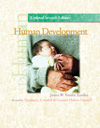 |  Human Development: Updated, 7/e James Vander Zanden,
Ohio State University
Thomas Crandell,
Broome Community College
Corinne Crandell,
Broome Community College
Early Adulthood: Emotional and Social Development
Chapter OutlineChapter 14 continues the exploration of early adulthood with the primary focus on love and work - the central themes of adult life. The chapter is subdivided into three main categories:
1Theories of Emotional and Social Development. A variety of relationships are examined. |
 |  |  | 2Options in Lifestyles. A variety of lifestyle patterns are examined, including leaving home, living at home, being single, living together, and being married. Homosexuality and bisexuality are discussed as well, and several theories are presented regarding the sources and causes of these behaviors. |
 |  |  | 3Stages of Development. Erikson, Levinson, and Gilligan are reviewed, and a critique of the stage approach is presented. |
 |  |  | 4Family Transitions. Sociologist Reuben Hill's nine stages in the family life cycle are outlined and critically evaluated. Pregnancy and the beginning of parenthood are discussed, with emphasis on the changes parents and families face during these transitional periods. Various current lifestyle patterns are examined as well, including those of employed mothers, single-parent mothers, and single-parent fathers. |
 |  |  | 5Relationships in Early Adulthood. Friendships and love are explored. |
 |  |  | 6Work. The significance of work for adults is discussed, including the social, emotional, and economic functions of work. The socioeconomic life cycle technique for studying the course of an individual's occupational status attainment is presented according to the studies of both sociologists and psychologists. |
|



 2003 McGraw-Hill Higher Education
2003 McGraw-Hill Higher Education